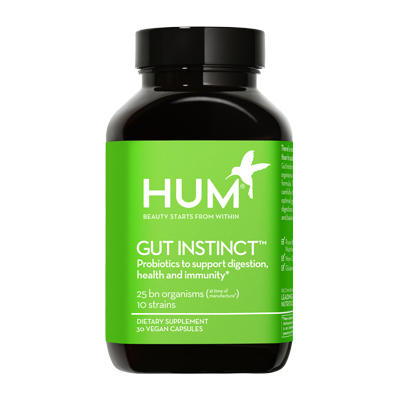The state of your gut impacts everything from your skin and stress to your mood and immunity. But is there a solid link between gut health and weight loss? We consulted gut health experts and the latest research to find out.
There’s no denying how influential the gut microbiome is on overall health. This colon-dwelling community of trillions of bacteria, fungi, and other microorganisms (some of which are good and protective, some of which not) plays a role in brain function and mood, sleep quality, skin health, healthy aging, immune system function, and inflammation.
Generally speaking, greater microbial diversity in the gut—and an abundance of “good” bacteria in relation to “bad”—is associated with positive health outcomes. On the other hand, low microbial diversity and an overabundance of harmful microbes (aka gut dysbiosis) may drive dysfunctional processes and adverse effects.
But how important is gut health for weight loss? While there’s not a clear cause-and-effect relationship, the interplay between the gut and a person’s diet and lifestyle influences a variety of processes that could make healthy weight loss harder or easier. Below, we’re highlighting key findings on gut health and weight loss—plus how the gut impacts metabolic health, cravings, and more. Plus: expert tips to optimize your gut’s microbial diversity for weight loss and wellness at large.
5 Fascinating Ways Your Gut Microbiome Could Impact Your Weight
The gut microbiome may impact weight from several different angles. “What we observe in the early research is that our microbiome is connected to our weight status, our inflammatory status, and potentially even our cravings,” says Desiree Nielsen, RD, a dietitian specializing in gut health and inflammation. (However, she adds that much of this research is in animal models and has yet to be confirmed in humans.)
Still, findings on gut health and weight loss is exciting. They support the notion that the gut microbiome may be a modifiable factor that can positively influence weight management. Here’s what we know to date:
1. A microbially diverse gut may help counter weight gain
We can’t say with certainty which specific gut bacteria are associated with weight gain. However, “A more diverse and abundant microbiota is associated with lower long-term weight gain,” says Kelsey Russell Murray, RD, founder of Gut Healthy Dietitian.
In one study on 123 non-obese and 169 obese Danish individuals, those who had fewer gut microbial genes present in their stool (an indicator of gut bacterial richness or diversity) were characterized as having greater overall fatty tissue, insulin resistance, abnormal blood lipid levels, and inflammation compared to those with greater bacterial richness. The individuals with obesity and low bacterial richness were also more likely to gain weight over time.
2. A leaky gut drives inflammation, which can promote fat storage and inhibit weight loss
The gut lining consists of a single layer of epithelial cells coated with a protective mucus layer that prevents pathogenic bacteria and toxins from entering the bloodstream… but this only works when the gut is in balance. Eating excess sugar and fat, experiencing chronic stress, and taking antibiotics can all lead to alterations in the gut microbiome that erode this layer, allowing invaders such as lipopolysaccharides (LPS) to cross into circulation. Moveover, consuming a diet low in fiber causes gut bacteria that would normally break down fiber to break down the gut’s mucosal layer instead, promoting a leaky gut.
So how might this inhibit weight loss? It likely starts with inflammation. “Increased circulating levels of LPS, which are fragments from certain types of bacteria, are associated with chronic inflammation and potentially insulin resistance,” says Nielsen. Normally, insulin is released after a meal and prompts cells to take up glucose from the bloodstream to keep levels in a safe range. But when this process is inefficient due to inflammation, blood glucose rises, forcing the body to pump out even more insulin to compensate. In turn, elevated insulin levels can suppress fat breakdown and promote fat storage.

3. Your gut influences the secretion of appetite-suppressing hormones
According to Nielsen, gut bacteria are in constant contact with our nervous system and can influence appetite and satiety in several ways. For example, when you regularly consume fiber-rich foods, beneficial bacterial species in your gut proliferate and ferment these fibers, resulting in the production of metabolites called short-chain fatty acids (SCFAs) such as acetate, butyrate, and propionate.
These SCFAs offer beneficial effects, such as:
- reducing inflammation
- improving gut barrier integrity
- promoting the secretion of gut hormones that promote satiety and reduce food intake, such as glucagon-like peptide-1 (GLP-1)
Research also suggests SCFAs may curb food intake by stimulating the vagus nerve, and by crossing the blood-brain barrier and triggering appetite-suppressing signals.
4. Certain bacterial species may extract more calories from food
“Firmicutes and Bacteroidetes are the main phylum of bacteria in our gut, and a higher F/B ratio is correlated to higher average weight,” says Sarah Greenfield, RD, a functional medicine practitioner and registered dietitian specializing in gut health. While both play an important role in nutrient metabolism, Firmicutes tend to be more efficient extractors of energy (or calories) than Bacteroidetes. In fact, some research suggests that a 20 percent increase in Firmicutes (and corresponding decrease in Bacteroidetes) could make someone absorb 150 extra calories per day.
So… what increases Firmicutes? Potentially diets that are higher in animal foods. Meanwhile, fiber-rich, predominantly plant-based diets have been shown to favor Bacteroidetes.
These points considered, the Firmicutes to Bacteroidetes ratio theory is a bit controversial. Some studies have not shown a correlation with weight, indicating that there’s likely a more complex system at play that involves interactions between gut microbes and factors such as genetics or the environment.
5. Your gut could influence your blood sugar response
“We know there is a correlation between certain bacterial types and glycemic response,” says Greenfield. “You can process sugar differently depending on the type and amounts of bacteria you have in your gut.” However, the specific types of bacteria and the mechanisms behind this gut-glycemic connection are unclear. Moreover, gut dysbiosis has also been associated with poor glycemic control among patients with autoimmune diabetes.
Essentially, this means that two people eating the same type and amount of ice cream could have significantly different elevations in blood glucose depending on the state of their gut health. You could have a sharp peak while your friend experiences more of a rolling hill. Big spikes in blood glucose—which are often followed by significant drops—could then lead to fatigue, irritability, and feelings of hunger that could rev up food intake and potentially impede weight loss.

7 ways to support your gut health for weight loss
On a mission to take your gut health and weight loss goals to the next level? The truth is that supporting your gut microbiome looks exactly the same whether you’re trying to lose weight, support immunity, or boost your mood. The game plan is simple: Do more things that promote gut microbial diversity while limiting foods and habits that suppress diversity and promote the growth of problematic microbes.
The good news is that your gut is incredibly adaptable. By following the gut-boosting tips below, you may be able to modify the abundance and type of your gut microbes in as little as three to four days, says Murray. But lasting changes that could impact long-term weight loss and health could take up to several months, so consistency is key.
- Gradually ramp up fiber intake. “High-fiber foods such as oats, berries, legumes, and seeds are filling,” says Nielsen. “They support blood sugar regulation and they offer a variety of indigestible carbohydrates that help drive a healthy gut microbiome.” Fiber is also vital for the production of beneficial SCFAs by gut bacteria. When possible, make half your plate fruits and veggies, and slowly work your way up to 30+ grams of fiber per day.
- Diversify your diet. Research suggests eating 30 types of plant-based foods per week can boost gut diversity. “Each different plant food that you eat provides fiber that feeds different gut bacteria, thereby increasing the diversity of the microbiome,” says Murray. Some ideas to rev up and diversify your plant intake: Buy a can of mixed beans instead of black beans, get mixed nuts instead of almonds, sprinkle hemp hearts on your peanut butter toast, add chia to your oatmeal, and add mixed greens and mixed frozen berries to your smoothie.
- Pop a probiotic supplement. Consider taking a probiotic supplement—ideally one that contains multiple strains of bifidobacterium and lactobacillus—like HUM’s Gut Instinct, to boost the diversity of your microbiome. While research is mixed on probiotic supplements and weight, one review of 25 randomized human trials found that probiotic supplementation reduced BMI and body weight. Consistent intake of probiotics (over eight or more weeks) with multiple bacterial species resulted in even greater weight loss.
- Embrace fermented foods. Fermented foods can help populate the gut with beneficial microbes. In a 2021 trial, participants who ate an average of six servings of fermented foods a day (e.g., yogurt, sauerkraut, kombucha, kefir, and kimchi) improved their gut diversity and decreased inflammatory markers in just 10 weeks. Nielsen’s top tips: Sip kombucha instead of soda, snack on plain yogurt and berries, and add a scoop of sauerkraut or kimchi to salads and grain bowls.
- Limit alcohol, sugar, and processed foods. Alcohol and sugary and processed foods can promote gut dysbiosis, metabolic dysregulation, and other consequences that drive weight gain and poor health. (Moreover, these foods often lead to overeating.) But you don’t need to go cold turkey or demonize them, either. “Your body is impacted [most] by what you do consistently,” says Murray. So the occasional slice of pizza should be fair game, given that you pack your plate with whole foods and hit your fiber and veggie targets regularly.
- Prioritize sleep and stress management. “Less sleep and higher stress levels can decrease gut diversity,” says Greenfield. Aim for a solid seven to nine hours of shut-eye per night and make time for moments of calm or stress relief throughout the day—whether that’s a quick five-minute walk every hour, a guided meditation at lunch, or taking a break to read. Adaptogens like ashwagandha, which you can find in HUM’s Calm Sweet Calm gummies, also help your body respond better to stress.
- Consider personalized testing. “I’m a huge advocate of personalized testing to really see what your own biological makeup looks like,” says Greenfield. “You can learn so much about your gut through stool testing, measuring inflammatory markers in the blood, and getting clear on food sensitivities.” Not sure where to start? Consider working with a functional dietitian or physician specializing in gut health to see what tests might be right for you, which can get you closer to your weight loss goals.










